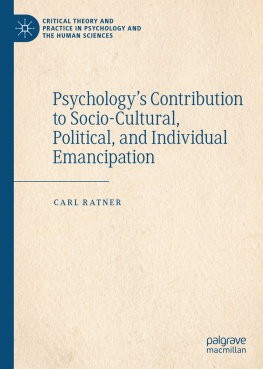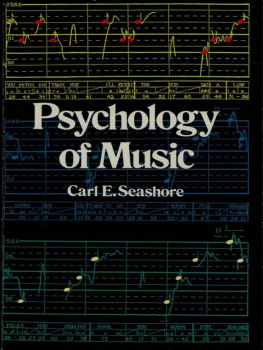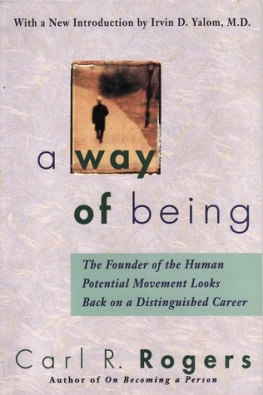Carl Ratner - Neoliberal Psychology
Here you can read online Carl Ratner - Neoliberal Psychology full text of the book (entire story) in english for free. Download pdf and epub, get meaning, cover and reviews about this ebook. year: 2019, publisher: Springer International Publishing, genre: Politics. Description of the work, (preface) as well as reviews are available. Best literature library LitArk.com created for fans of good reading and offers a wide selection of genres:
Romance novel
Science fiction
Adventure
Detective
Science
History
Home and family
Prose
Art
Politics
Computer
Non-fiction
Religion
Business
Children
Humor
Choose a favorite category and find really read worthwhile books. Enjoy immersion in the world of imagination, feel the emotions of the characters or learn something new for yourself, make an fascinating discovery.
- Book:Neoliberal Psychology
- Author:
- Publisher:Springer International Publishing
- Genre:
- Year:2019
- Rating:4 / 5
- Favourites:Add to favourites
- Your mark:
- 80
- 1
- 2
- 3
- 4
- 5
Neoliberal Psychology: summary, description and annotation
We offer to read an annotation, description, summary or preface (depends on what the author of the book "Neoliberal Psychology" wrote himself). If you haven't found the necessary information about the book — write in the comments, we will try to find it.
Carl Ratner: author's other books
Who wrote Neoliberal Psychology? Find out the surname, the name of the author of the book and a list of all author's works by series.
Neoliberal Psychology — read online for free the complete book (whole text) full work
Below is the text of the book, divided by pages. System saving the place of the last page read, allows you to conveniently read the book "Neoliberal Psychology" online for free, without having to search again every time where you left off. Put a bookmark, and you can go to the page where you finished reading at any time.
Font size:
Interval:
Bookmark:

Explores problems and challenges to mental health, psychosocial wellbeing, human growth and development, and human welfare that are emerging from our contemporary global context. It advances in psychological knowledge regarding the nature and consequences of the many social, cultural, economic, political, and environmental events and forces that affect individuals and communities throughout the world.
The series covers areas like therapy, assessment, organizational psychology, community psychology, gender, child development, and specific disorders. In addition, it addresses major global challenges such as poverty, peace, urbanization, modernization, refugees, and migration. The series acknowledges the multidisciplinary, multisectoral, and multicultural nature of the global context of our lives, and publishes books that reflect this reality.
More information about this series at http://www.springer.com/series/6089

This Springer imprint is published by the registered company Springer Nature Switzerland AG
The registered company address is: Gewerbestrasse 11, 6330 Cham, Switzerland
To Lumei. Lemon tree very pretty and the lemon flower is sweet
This book is about the psychology of people living in neoliberal capitalist society. Their psychology is neoliberal psychology. It is infused with neoliberal form and content. These characteristics of neoliberal psychology are derived from the characteristics of neoliberal society and require a deep understanding of the latter. Neoliberal psychology is thus a vital insight into neoliberal society. Neoliberal psychology brings society into psychology, and psychology into society. It breaks down the false, artificial division between society and psychology that is practiced in academia and in everyday life.
This book has been motivated by four concerns: (1) to scientifically understand the cultural psychology of people in the neoliberal era, (2) to develop the academic discipline of cultural psychology to become adequate to comprehending neoliberal psychology, (3) to utilize neoliberal psychology to deepen our understanding of neoliberal society (which is dominant around the world), and (4) to utilize our understanding of neoliberal psychology and neoliberal society to enrich/improve our current psychology and social system. We need a coherent understanding of the present and its dialectical potential for a qualitatively improved future. The current lack of this understanding is responsible for the triple errors of current social trends: (a) ignoring or accepting the true causes of oppression, and electing economic and political oppressors as social leaders, (b) attacking innocent scapegoats such as immigrants, gender, religious groups, and race, and (c) lacking a vision of a viable, comprehensive alternative to neoliberalism. All of these errors intensify the oppression and crises that afflict the populace.
The distinctive contribution of cultural psychology to social emancipation lies in the scientific conceptualization of psychological phenomena as cultural phenomena that are elements of cultural factors and processes. It follows that enriching, fulfilling, and emancipating psychology requires enriching, fulfilling, and emancipating its cultural basis and character. No other psychological approach includes emancipating the social system within its purview because no other approach conceptualizes psychology as elements of the system.
The political, critical, transformative, and emancipatory thrust of cultural psychology is particularly necessary in this era of cascading geopolitical, environmental, economic, and moral disasters. This book elucidates the contribution that cultural psychology can make to salvaging and advancing human civilization.
Neoliberal psychology is not simply certain natural reactions to neoliberal society. It is not simply that neoliberal society galvanizes our anxiety or confusion or hyperactivity or suspiciousness or defensiveness or depression or confidence, or creativity. These abstract, psychobiological reactions to neoliberalism do not capture the neoliberal form and content of our psychology. They would actually reduce neoliberal psychology to a quantitative point on a universal scale. They would reduce culture to a simple, quantitative regulator of universal, specific psychological processes. (This is the methodology of most cross-cultural psychologists who compare diverse cultures on their degree of religiosity, or neuroticism.)
Neoliberal psychology, like all psychology, is a concrete form and content of psychological processese.g., emotions, perception, cognition, motivation, memory, and psychological disturbance. Neoliberal psychology is not how we respond to neoliberalism on the basis of our individual (biological or personal) response mechanisms (which are outside neoliberalism). Neoliberal psychology is how neoliberalism forms our psychological responses to things, events, and people. We do not simply respond to neoliberalism; we are neoliberal responders.
The concrete, neoliberal form and content of psychology are our self, our emotion of love, our sexuality, our attention and perception, our memory, our child development, our femininity, our masculinity, our parenting, our eating, our dressing, our thinking/reasoning, our needs, and our communicating.
Our psychology is not simply situated within a neoliberal context; our psychology is infused with the features of that context.(Vygotsky 1994b, p. 348, said The environment is a factor in the realm of personality development, and its role is to act as the source of this development and not its context.) The neoliberal context is within us as well as outside. We do not simply live in neoliberal capitalism; we live neoliberal capitalism. Neoliberalism is our life, and we are the life of neoliberal capitalism; we are neoliberal subjects, we are neoliberal agents, and we have neoliberal psychology which is the subjectivity of neoliberal capitalism.
Font size:
Interval:
Bookmark:
Similar books «Neoliberal Psychology»
Look at similar books to Neoliberal Psychology. We have selected literature similar in name and meaning in the hope of providing readers with more options to find new, interesting, not yet read works.
Discussion, reviews of the book Neoliberal Psychology and just readers' own opinions. Leave your comments, write what you think about the work, its meaning or the main characters. Specify what exactly you liked and what you didn't like, and why you think so.












